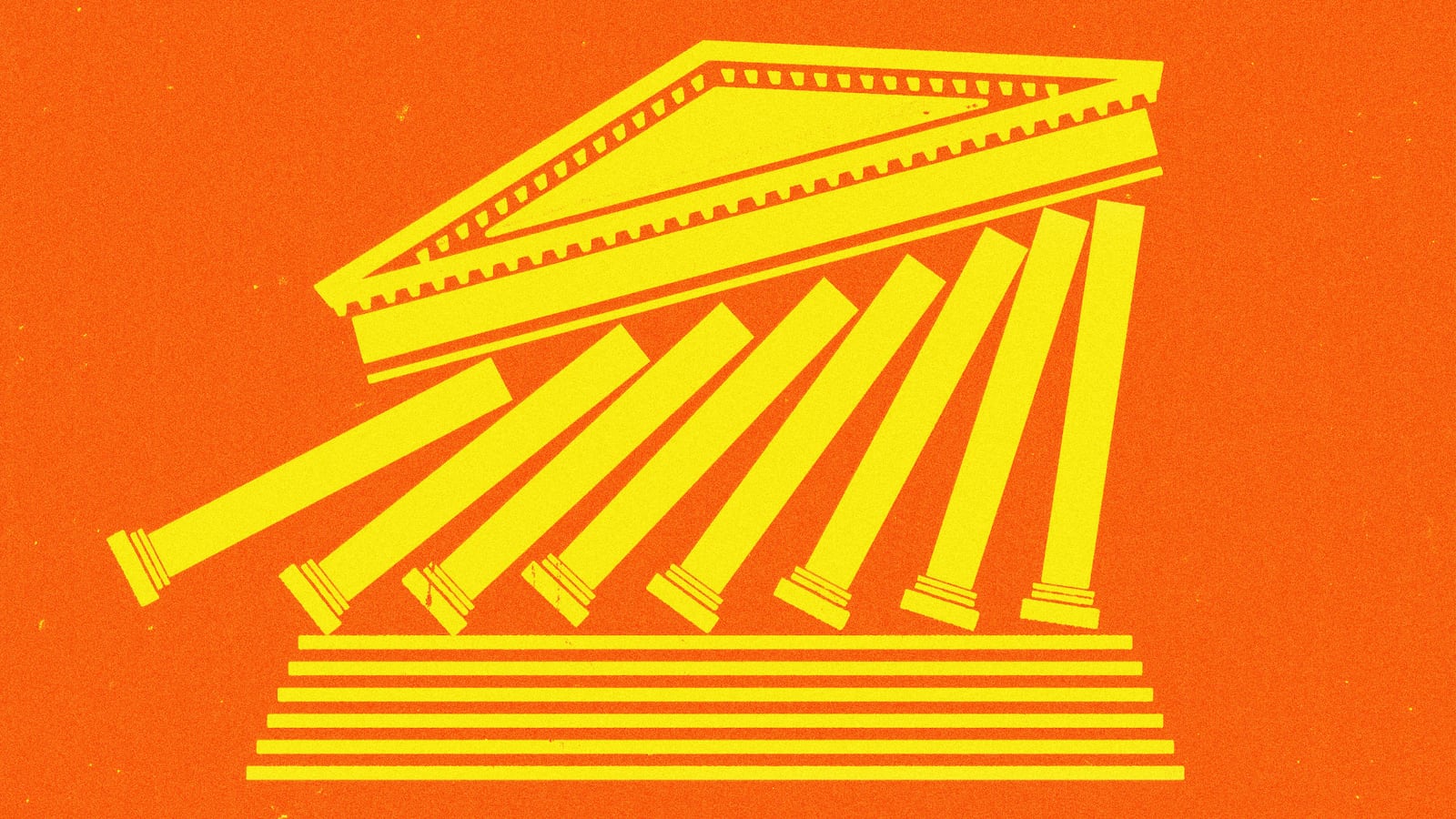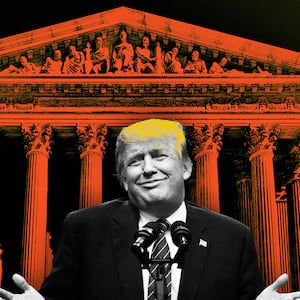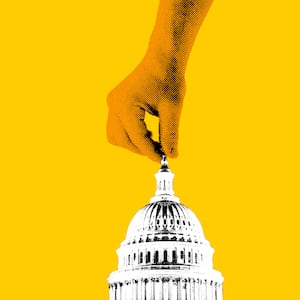I don’t think most Americans realize how close we are to losing everything we most value about our system of government.
It is not just that the leader of one of our two political parties has declared that if reelected he will assume the powers of a dictator. It is not just that he and his followers actively support enemies of the United States. It is not just that he and members of his party in the U.S. Congress seek to strip away more fundamental rights from American women and men, or that they have already demonstrated they are willing to tolerate egregious abuses of presidential power, or that they will abet efforts to steal election results with which they disagree.
It is all these things. But as we saw again this week, while opponents of fundamental American values control the House of Representatives, have a significant voice in the U.S. Senate, and aspire to reclaim the White House, the branch of government that has been most corrupted by the American right remains the United States Supreme Court.
The Court—through its decision to hear the ludicrous, anti-constitutional arguments of Donald Trump’s lawyers that his actions to steal a presidential election were protected by so-called “presidential immunity”—reminded us that throughout this century the right wing on the court has done grave damage to our country and the judicial system whose oversight has been entrusted to them.
Cases like Citizens United (granting the rich more influence in elections), Shelby County (undermining voting rights), Heller (expanding gun rights), Bruen (striking down sensible gun controls), Dobbs (overturning Roe v. Wade), and Students for Fair Admissions (gutting affirmative action) are just a few of the notable examples of their service to their benefactors and their political agenda.

Pro-Trump supporters storm the U.S. Capitol following a rally with President Donald Trump on January 6, 2021 in Washington, DC.
Samuel Corum / GettyThe Court’s decision to hear the Trump immunity case was outrageous, legally indefensible, and handled procedurally in a way that made it clear they were no longer acting as a court, but rather as the judicial arm of the Republican Party.
They took a case they should not have accepted, agreeing to hear arguments that were already rejected in an expertly argued appeals court decision. Just as damagingly, they did so in a way that—regardless of their final ruling—would mean American voters would likely not hear a verdict before November’s election.
It is a dark irony. They have chosen to hear the Department of Justice’s case against Donald Trump for election interference in a way that is itself election interference.
But such contradictions are the norm for this court’s right-wing majority. They condemn judicial activism while serving as its leading practitioners. They call themselves “textualists” and yet have demonstrated a complete disregard for the actual words of the Constitution, the meaning of those words, or the reasons they were chosen. They describe their philosophy as “originalism” not because it cleaves to the original intent of the framers, but because their willingness to twist the law to suit their ideology requires a kind of free-wheeling creative originality.
Time and again, the Supreme Court has been at the vanguard of the right-wing’s movement to reverse social progress, while also increasing the wealth and power of the movement’s patrons. And, repeatedly, the Court has been brazen in its willingness to play politics, the letter of the law, legal tradition, and any semblance of legal logic or ethics be damned.
If this week’s decision resonated with any moment in this court’s recent history it is with the Bush v. Gore decision in 2000. In that case, the Republican-appointed majority on the Court weighed in to reject the demands of Florida voters to have all their votes counted. The Court’s decision effectively cast the five deciding votes in that year’s presidential election on behalf of George W. Bush.
Only one justice from that Court still serves today. Tellingly, it is Clarence Thomas, arguably the most corrupt Supreme Court justice in history, famed recipient of the eye-watering largesse of right-wing billionaires and husband to a woman who was an active participant in the coup attempt at the center of this week’s case.
Did Thomas recuse himself? Of course not. Because if there is one principle to which this Court’s majority—and the political movement of which it is a part—adheres, it’s that the impunity of its leaders is valued above all else.
Why conclude that the decision to hear the immunity case was purely political? Several reasons. First, the argument advanced by Trump and his lawyers that a president is above the law is, in the well-chosen words of Yale history professor Timothy Snyder, “a proposition that, if affirmed, would destroy the moral, legal, and political foundations of the court itself.”

US President Donald Trump arrives to speak to supporters from The Ellipse near the White House on January 6, 2021, in Washington, DC.
Brendan Smialowski / GettyFurther, the arguments made by Trump’s lawyers were expertly dissected and discarded by a bipartisan panel of three judges on the D.C. Circuit of Appeals. Their decision was so thoroughly grounded in law and precedent that frankly, only a Supreme Court with no regard for law or precedent would determine they had to consider any additional aspect of the matter.
In fact, the Trump immunity claims are so laughable that few expect even this Supreme Court to uphold them. This may be why, in lieu of helping Trump with a decision, they decided to throw him the one lifeline upon which he most depended, a delay that would push a verdict in the trial to the other side of election day.
Forcing delay was a conscious choice. They did not have to. Special Counsel Jack Smith asked them to rule on the issue as far back as December. They could have ruled on it then, or in an instant following the D.C. Circuit decision by simply agreeing not to hear the case and thereby accepting the D.C. Circuit’s findings.
Or, had they wanted to hear the case but not wanted to push the trial’s likely verdict until after the election, they could have accepted it immediately after the D.C. decision came down on Feb. 6 of this year. Instead, they waited three weeks to announce they would hear the case the week of April 22.
With a decision unlikely until May or, more probably, late June, and with the judge presiding over the election interference case promising roughly three months of additional prep time for lawyers before the case begins, that could well push the start date for the trial until September or October.
The trial itself is expected to take three months, which means the earliest likely date for a verdict would be December or January. And that is assuming no more delays.
Could they have moved faster? Of course. The Court accepted the case of Bush v. Gore on Dec. 9, 2000. It heard arguments on Dec. 11. It issued a decision on the next day.
The Court made a choice that they knew would have political consequences. They knew those consequences would redound to the benefit of Donald Trump. And with eyes wide open they provided him with those benefits.
They thereby increased the likelihood that Trump, who appointed three of the justices on the court, would win in November—and then end all the cases against him for his abuses of power.

Associate Justice Clarence Thomas sits during a group photo of the Justices at the Supreme Court in Washington, DC on April 23, 2021.
Erin Schaff / GettyIn other words, Clarence Thomas and his right-wing colleagues have picked up where the mob his wife helped support left off on Jan. 6.
Should Trump win—and should he follow through on his plans to further weaken democracy in the U.S. and strip away core freedoms of Americans—this week’s indefensible decision will be cited by historians as a time when a corrupt court openly played politics, the American people lost, and our enemies won.









